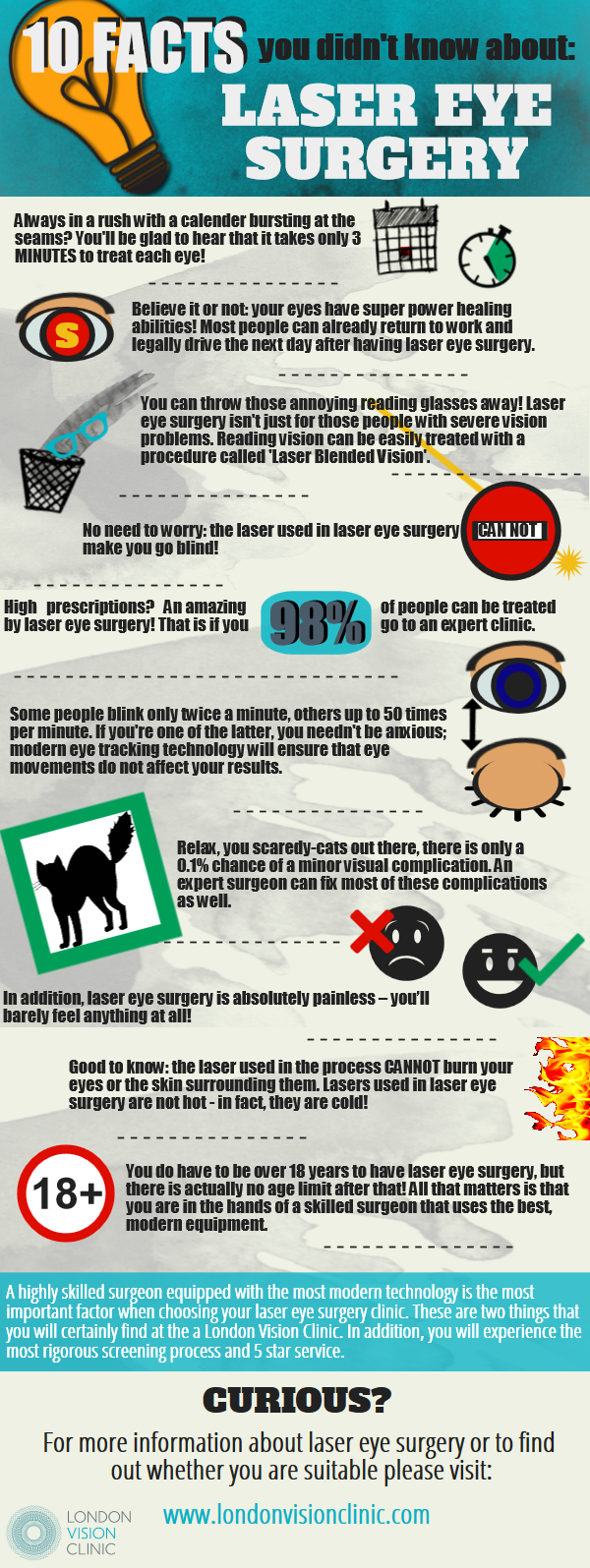Is SMILE Eye Surgical Procedure Right For You? Trick Factors To Consider And Insights

Material Writer-McDowell Thestrup
If you're contemplating SMILE eye surgery, contemplate this: are you prepared to embrace prospective aesthetic freedom, or does the idea of any risks make you hesitate? Your decision will hinge on a careful equilibrium of evaluating the advantages against the unpredictabilities. It's crucial to dig deeper right into the nuances of SMILE surgical procedure to make an educated option that aligns with your visual objectives.
Recognizing SMILE Eye Surgical Treatment
When considering SMILE Eye Surgical procedure, it's important to recognize the procedure and its advantages. SMILE, which represents Tiny Laceration Lenticule Extraction, is a minimally intrusive laser eye surgery that deals with common vision troubles like nearsightedness (nearsightedness).
Throughout the treatment, your eye cosmetic surgeon will use a femtosecond laser to produce a little incision in your cornea. With this incision, a tiny disc of tissue called a lenticule is eliminated, improving the cornea and fixing your vision.
One of the crucial benefits of SMILE Eye Surgery is its fast recuperation time. Numerous individuals experience enhanced vision within a day or 2 after the treatment, with very little pain.
In addition, SMILE is known for its high success price in offering long-term vision correction. Unlike LASIK, SMILE does not require the creation of a flap in the cornea, lowering the danger of problems and allowing for a much more secure corneal framework post-surgery.
Comprehending the treatment and its benefits is essential when taking into consideration SMILE Eye Surgical procedure for vision adjustment.
Pros and Cons of SMILE
Considering SMILE Eye Surgical procedure for vision improvement includes different benefits and prospective downsides.
Among the primary pros of SMILE is its minimally invasive nature, as it entails a small cut and usually results in quick healing times. The treatment is additionally known for triggering very little pain and dry eye symptoms post-surgery compared to various other vision correction methods. In addition, SMILE has been shown to supply exceptional visual results, with many people achieving 20/20 vision or much better.
On the other hand, a prospective disadvantage of SMILE is that it may not appropriate for people with severe refractive mistakes, as the treatment variety is rather limited contrasted to LASIK. Another consideration is that the learning curve for doctors carrying out SMILE can affect the schedule of knowledgeable suppliers in particular locations.
It is necessary to weigh these pros and cons very carefully when choosing if SMILE is the right selection for your vision improvement demands.
Identifying Eligibility for SMILE
To establish if you're qualified for SMILE eye surgical treatment, your eye doctor will certainly perform a thorough examination of your eye health and wellness and vision needs. During this evaluation, elements such as the stability of your vision prescription, the thickness of your cornea, and the overall health of your eyes will be examined.
Normally, simply click the next web page for SMILE are over 22 years of ages, have a stable vision prescription for a minimum of a year, and have healthy and balanced corneas without conditions like keratoconus.
Your optometrist will also consider your overall eye wellness, any existing eye problems, and your way of living requires to establish if SMILE is the appropriate option for you. It's important to interact any type of details aesthetic needs or concerns you may have throughout this assessment to make certain that the therapy straightens with your assumptions.
If you aren't qualified for SMILE, your ophthalmologist may suggest alternate vision correction alternatives that far better fit your specific requirements and eye health standing.
Conclusion
Inevitably, making a decision whether SMILE eye surgery is right for you needs cautious factor to consider of your specific eye health and wellness and visual needs. Speak with your optometrist to determine your eligibility for the treatment and weigh the potential benefits and disadvantages. Remember to interact relevant website or concerns you might have during the assessment procedure to make an educated decision regarding your vision modification choices.

